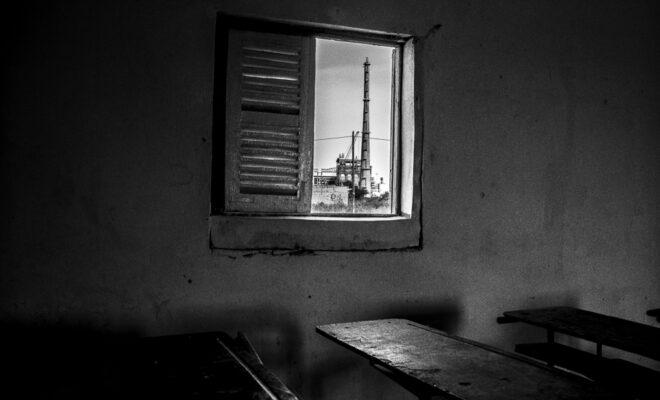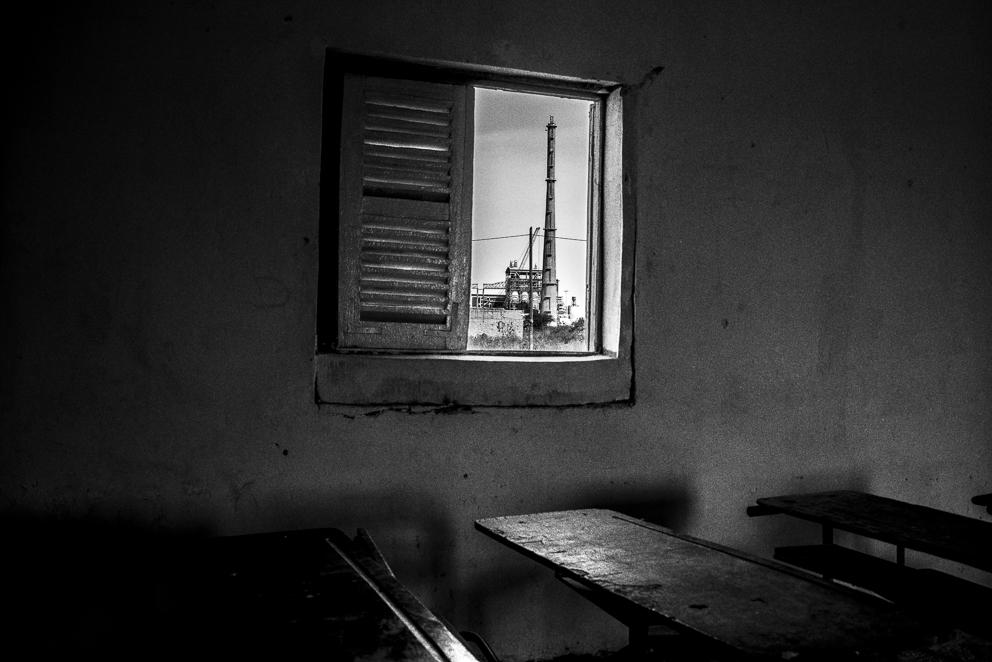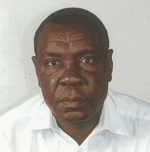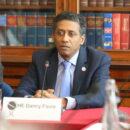“Only the port will remain”: Senegal’s grand vision and its discontents

Senegal plans to build a large port at Bargny-Sendou, but fishermen, farmers, nomads and residents are pushing back.

View from one of the classrooms of Miniam Primary School. It is located 388m from the coal-fired power plant that is soon in operation. According to teachers, there is still no plan to relocate the school. Credit: Pierre Vanneste.
On 27 November 2017, Prime Minister Mahammed Dionne stepped in for President Macky Sall to lay the foundation stone of one of Senegal’s major infrastructure projects. In front of traditional dancers and spectators waving supportive banners and signs, he marked the start of construction of a new port in the small town of Bargny.
As this was happening, a group of residents gathered a short distance down the coast in Sendou. They were concerned about the effects the new 290 billion CFA francs ($50 million) project might have on their communities. They had planned to protest against it, but were blocked from leaving their village.
One and half years later, things have begun to change here on the Senegalese coast. A perimeter wall has been erected around a 484-hectare plot of land. This area will eventually contain a four-kilometre pier and two terminals able to process 12 million tons of goods – from oil and gas, to foods and mineral ore – each year. Many of the fears of Bargny and Sendou’s inhabitants have started to become real.
Up till now, for example, Bargny has been a fishing village, with an estimated 80% of the 70,000 population relying on this sector for employment. Many fear that these livelihoods will become untenable, however, once the sea becomes crowded with transport ships and filled with their pollution. The port project promises to create 740 to 2,600 new jobs, but locals like Mamadou Diop, 45, who has been fishing since he was ten years old, doubt if they will go to people like him. “Not everyone can work at the port,” he says, “but only the port will remain.”
Local farmers are also worried. The construction work has already deprived many of the land they once cultivated. Yanga Mbengue, for example, was forced off the three hectares on which she used to grow okra. Like the majority of the population, she did not have titles to the land and so was only owed compensation for the crops found on the day of inspection. That sum came to just 150,000 CFA francs ($260), a sum for which she is still waiting a year later. “We had always cultivated these lands. What will we live on today?,” she asks.
Even nomadic herders are concerned about what the seizure of land by the port – as well as by a new 125MW coal plant and urban development projects – will mean for their way of life. Some pastoralists such as Omar Kâ and Elhadji Kâ, who have never seen a port in their lives, hope their young people will be able to find employment among these new schemes, but no one has come to consult them or explain what impact the projects will have on their communities. “They plugged up the quarries for the construction of the port,” says Elhadji, a leader among the livestock farmers. “Since then, we can no longer used to water livestock. There are still those one behind the power coal plant, but once the port wall is closed, we will no longer have access to them.”
The worries of local people in Bargy and Sendou are compounded by the high level of uncertainty surrounding the port. No official environmental impact report has been published. However, an interim study, submitted to the Ministry of the Environment and Sustainable Development in December 2018, warns of coastal erosion, the destruction of marine biodiversity, the end of agriculture and livestock farming, and the relocation of hundreds of people. These findings have not been published and there have been no public hearings around them, but this has not stopped companies terracing the land and starting building works.
In recent months, Sendou’s inhabitants have also learned that an additional 250-metre safety zone will be added to the initial plan. This extension will amputate a third of the municipality’s dwellings, but residents are trying to resist.
“One day, they came with the prefect to make a census of the houses located in the perimeter of the 250 metres requested by the port,” says resident Cheikh Tidiane Ndoye. “Fortunately, people weren’t ready to welcome them because if we accept the census, that means we agree to leave.”
On 26 January 2019, people from Bargny and Sendou organised a protest to express their wider frustrations at the project and what they see as the state’s disregard.
“People are no longer able to make ends meet,” complained local coordinator Issa Gueye. “There are those who have lost their fields, those whose homes are threatened with expropriation and then those who will live next door.”
“People haven’t cultivated for a year now, and no compensation,” he continued. “We have produced a memorandum that we have forwarded to the Fisheries’ Minister, Oumar Gueye, who is the project manager. But so far, there has been no reaction. He can’t give us a hearing.”
As part of this demonstration, the people gave Senegal’s government a two-month ultimatum to act. Less than a month later, President Macky Sall announced that 500 million CFA francs ($856,000) would be paid out to people impacted by the port. This promise, however, was met with plenty of scepticism. According to Issa Gueye, the payment was only intended for farmers with “neither the landowners nor the Sendou’s inhabitants included”. Meanwhile, many noted that the promise was made just four days before the presidential election in which Sall was running for re-election.
“This is more the statement of candidate Macky than that of the President of the Republic,” says Gueye.
The compensation was not disbursed before the election, and several weeks after Sall was re-elected, the residents of Bargny and Sendou are still waiting for recognition as many of their lives, livelihoods and homes look set to be transformed by the new port project. According to Gueye, a new march has been scheduled for 10 April.
The Senegalese government and Senegal Mingery Port special purpose vehicle set up to undertake the design, building and operation of the Bargny-Sendou port were contacted for comment but did not respond.






